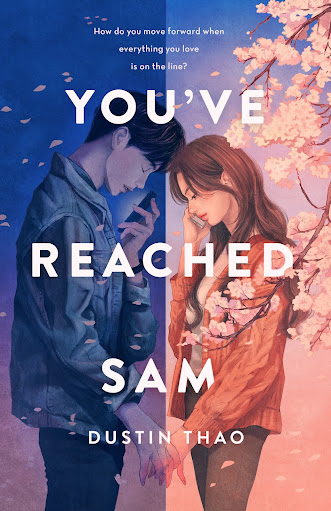You've Reached Sam / Dustin Thao / Book Review
You've Reached Sam
Blurb
It was her fault. She knows it was her fault. Sam wouldn't have even been on the road the night he died if it wasn't for her and their stupid argument. Now the only thing Julie can do is forget, move on, erase Sam from her life completely. It's just too hard to think about him. But before she can get rid of him, she has to hear his voice one more time. So Julie calls him, just to hear the recording on his answering machine before they shut it off. That's all she wants--his voice one more time. But instead of the answering machine on the other end of the line, Sam himself picks up.
Thoughts
When the best I can say is that this book had a good concept, you know there's a big problem. And unfortunately, that's about the best I can say.
Thoughts
When the best I can say is that this book had a good concept, you know there's a big problem. And unfortunately, that's about the best I can say.
Pros
- Hard Grief: Grief is certainly a trend that I've noticed in contemporary YA, but it is a good one. A lot of contemporary books from this past year really dove into the nuances of grief--especially grief involving the loss of someone close and unexpected, like a parent or a friend. This book, too, dives into those difficult and yet unexplored dark depths.
- Accessible Writing: This book reads like a fanfiction--and I don't really mean that in a bad way. Often, books that deal with hard and difficult topics are also hard and difficult themselves, and not for the content. The writing itself can be a barrier to reaching the audience. Here, there is no such problem. All kinds of readers will be able to pick up this book with ease. The prose isn't deep. It doesn't need to be dissected, and that makes this a good read for just about anybody.
- Great Concept: You certainly can't make a good book from a bad concept. Not even the best writer can polish an idea that's truly bad. And this book has that good concept. Finding some supernatural sort of way to connect with the dead in the midst of grieving? A last-ditch phone call to keep him on the line longer, to get a second chance? Yes, it's a great concept. The idea itself is solid, though unfortunately the execution here didn't quite work.
Cons
- Abundant Italics: Now, this may be a problem with the uncorrected proof I was sent to review, so hopefully this isn't an issue with the print publication. I hope. The italics did, however, feel quite purposeful, so it is quite likely they are in the final draft... And I say they felt purposeful, because they didn't seem random. But for the life of me, I couldn't figure out why they were being used. They were used for flashbacks, for entire lines of dialogue, for seemingly random other bits of text throughout the book. It was overkill--seemingly intentional overkill--and I just couldn't figure out what was going on. The italics here was so abundant that they lost all meaning entirely.
- Repetitive Conversations: This, honestly, is the biggest problem with the book. This book relies very heavily on dialogue, as one could expect. It's primarily about phone calls, after all. So the fact that the conversations are incredibly repetitive is a major problem. The conversations go around and around, and not in a good way that shows tension or struggle. There are no new character insights, no new interpersonal problems highlighted. No new information gleaned. The dialogue here is poorly crafted. It doesn't read like good dialogue produced for a book that relies on dialogue. It doesn't even read like you're overhearing a badly edited conversation in real life. It just isn't good.
- Telling: Don't get me wrong. This isn't the general complaint you hear--the complaint rooted in the supposed writing "rule" that is "Show, Don't Tell." There is a clear purpose for "telling" in any story, something strict followers of that rule don't recognize. But there is a reason such a rule exists, and it is exactly for this type of writing. So, so much of this book is just told to me as a reader--so many details that weren't relevant to the plot, the character development, the story as a whole. These details could have been relevant in they had come up naturally, but they didn't. This book is full of random dumps of information, and there are long (very long) passages dedicated to random facets that just don't build the characters, world, setting, plot... anything. And that is the major problem with too much "telling." As a writer, you can definitely tells us things that happen, but first one must ask, "What does this add to the story itself?" If it doesn't do more than hit the bullet points on a character-building worksheet, it shouldn't really make the page.
Rating
⭐⭐
2/10
Fans of Ashley Schumacher's Amelia Unabridged will appreciate the close examination of unexpected grief. Those who loved the journey of healing in Joan F. Smith's The Half Orphan's Handbook will enjoy the character arc that happens here.
Details
Note: I was provided with an ARC by the publisher through Netgalley in exchange for an honest review. All opinions here are my own.

.jpg)

A good idea wasted.
ReplyDelete